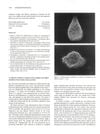 11 citations,
October 2018 in “The Journal of Dermatology”
11 citations,
October 2018 in “The Journal of Dermatology” Decorin helps keep hair follicle stem cells and may prevent age-related hair loss.
 11 citations,
August 2013 in “Facial Plastic Surgery Clinics of North America”
11 citations,
August 2013 in “Facial Plastic Surgery Clinics of North America” New cell-based therapies may improve hair loss treatments in the future.
 11 citations,
June 2012 in “Archives of Dermatological Research”
11 citations,
June 2012 in “Archives of Dermatological Research” L-cystine and vitamin B6 at high doses prevented hair loss in mice treated with a chemotherapy drug.
 11 citations,
November 1990 in “Archives of Dermatology”
11 citations,
November 1990 in “Archives of Dermatology” A woman developed a persistent skin rash and hair loss from a condition linked to her increased L-tryptophan intake.
 10 citations,
May 2019 in “BMC Complementary and Alternative Medicine”
10 citations,
May 2019 in “BMC Complementary and Alternative Medicine” The extract from Bacillus/Trapa japonica fruit helps increase hair growth and could be a potential treatment for hair loss.
 10 citations,
June 2016 in “Wound Repair and Regeneration”
10 citations,
June 2016 in “Wound Repair and Regeneration” The microenvironment, especially mechanical forces, plays a crucial role in hair growth and could lead to new treatments for hair loss.
 10 citations,
March 2015 in “American journal of primatology”
10 citations,
March 2015 in “American journal of primatology” Ingesting Leucaena leucocephala caused hair loss and increased infant mortality in ringtailed lemurs.
 10 citations,
April 2000 in “Archives of Oral Biology”
10 citations,
April 2000 in “Archives of Oral Biology” Minocycline may cause hair loss by increasing DHT levels, but finasteride can help counteract this effect.
 9 citations,
October 2011 in “Journal of proteomics”
9 citations,
October 2011 in “Journal of proteomics” Taxol damages hair growth cells, causing hair loss.
 9 citations,
November 2009 in “Journal of the European Academy of Dermatology and Venereology”
9 citations,
November 2009 in “Journal of the European Academy of Dermatology and Venereology” Cutting scalp biopsies in consecutive slices improves diagnosis of hair loss conditions.
9 citations,
September 2009 in “PubMed” Antigen presenting cells around hair follicles are crucial in SLE-related hair loss.
 9 citations,
January 2005 in “Experimental dermatology”
9 citations,
January 2005 in “Experimental dermatology” Melatonin receptors in hair follicles help regulate hair growth and could treat hair loss.
 8 citations,
October 2018 in “Applied sciences”
8 citations,
October 2018 in “Applied sciences” Alginate spheres help maintain hair growth potential in human cells for hair loss treatment.
 8 citations,
September 1993 in “British journal of dermatology/British journal of dermatology, Supplement”
8 citations,
September 1993 in “British journal of dermatology/British journal of dermatology, Supplement” A new method helps isolate key hair components to study hair growth and loss.
 8 citations,
March 1979 in “International Journal of Dermatology”
8 citations,
March 1979 in “International Journal of Dermatology” Dr. Vera H. Price's 1979 work emphasizes the importance of accurate diagnosis and personalized treatment for hair loss.
 7 citations,
July 2019 in “Clinics in Dermatology”
7 citations,
July 2019 in “Clinics in Dermatology” Hair loss can indicate or worsen with systemic diseases, and treating the underlying condition is important.
 7 citations,
July 2018 in “Biological & Pharmaceutical Bulletin”
7 citations,
July 2018 in “Biological & Pharmaceutical Bulletin” Phyllanthus urinaria extract may help treat hair loss by blocking a hair-related enzyme.
6 citations,
May 2023 in “International journal of molecular sciences” Collagen-enhanced mesenchymal stem cells significantly improve skin wound healing.
 6 citations,
April 2019 in “Journal of Cosmetic Dermatology”
6 citations,
April 2019 in “Journal of Cosmetic Dermatology” Hair loss affects women's self-esteem; treatments like minoxidil can help.
 6 citations,
November 2017 in “Skin appendage disorders”
6 citations,
November 2017 in “Skin appendage disorders” Topical botanical lotion increases hair density and improves quality of life in women with hair loss.
 6 citations,
January 2010 in “Actas Dermo-Sifiliográficas”
6 citations,
January 2010 in “Actas Dermo-Sifiliográficas” Follicular Unit Hair Transplantation has become a less invasive procedure with natural results, suitable for certain adults with hair loss.
 6 citations,
October 1997 in “CNS Drugs”
6 citations,
October 1997 in “CNS Drugs” Psychotropic drugs can cause hair loss or excessive hair growth.
5 citations,
April 2022 in “The journal of investigative dermatology/Journal of investigative dermatology” A new therapy for a skin blistering condition has not been developed yet.
 5 citations,
February 2019 in “Oral and Maxillofacial Surgery”
5 citations,
February 2019 in “Oral and Maxillofacial Surgery” Hair loss can be reversed or even cured using advanced hair restoration techniques, with rare complications like swelling and bleeding.
 4 citations,
January 2013 in “European Journal of Dermatology”
4 citations,
January 2013 in “European Journal of Dermatology” Epigenetic differences affect hair loss in identical Japanese male twins.
 4 citations,
August 2007 in “Journal of The American Academy of Dermatology”
4 citations,
August 2007 in “Journal of The American Academy of Dermatology” The document discusses a condition causing hair loss after surgery and a type of rosacea affecting the nose, with treatments including surgery and laser therapy.
 3 citations,
June 2023 in “Frontiers in medicine”
3 citations,
June 2023 in “Frontiers in medicine” Oxidative stress may contribute to hair loss in alopecia areata and antioxidants could potentially help as a treatment.
3 citations,
August 2022 in “International Journal of Molecular Sciences” COVID-19 can cause hair loss, and treatments like PRP and stem cells might help.
 3 citations,
January 2020 in “PubMed”
3 citations,
January 2020 in “PubMed” Adding insulin-like growth factor 1 and bone marrow-derived stem cells to a collagen-chitosan scaffold helps wounds heal faster and regrows hair follicles.
 3 citations,
November 2019 in “Journal of Investigative Dermatology”
3 citations,
November 2019 in “Journal of Investigative Dermatology” Adenosine helps human hair grow and prevents hair loss by targeting specific cells.


























